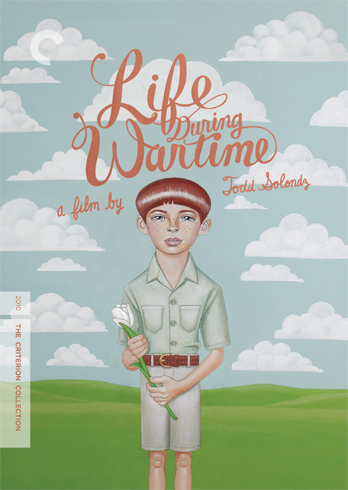
"People can't help if they're monsters."
This one line could sum up the entirety of Todd Solondz's oeuvre--or at the very least, what I have seen. It is both his justification and his pitiable condemnation. In his most recent film, last year's Life During Wartime, this is the defense that Bill, played with a stoic empathy by the fantastic Ciaran Hinds, gives of his own poor choices. Bill is a child molester recently released from prison who has gone to Florida from New Jersey in search of his sons. He utters this particular philosophy in a bar where he is being cruised by a bitter older woman (Charlotte Rampling) who arguably could stand in for Solondz himself. She is angry and vicious and ultimately, self-loathing. The implication is that we are all capable of monstrous behavior, but we all also need love.
Or not love exactly. As explicitly stated in Life During Wartime, the greatest human virtue is forgiveness. In lieu of that, or possibly even preferred to it, there is also forgetfulness. That's the debate Solondz's characters have as they trudge through their weary existences: if we're incapable of doing both, is it better to forgive or forget? Forgiveness gives absolution to the offenders, but we still carry the pain they caused, and presumably, they still carry the shame of having caused it. And so, was it better for Bill's wife, Trish (a typically excellent Allison Janney), to tell their youngest children that he died rather than explain he was incarcerated for diddling little boys? Presumably not, judging by the anguish it causes little Timmy (Dylan Riley Snyder) when the truth comes out. Now he has something he can never forget. The past is always with us, regardless of the different people we may try, and even succeed, to become.
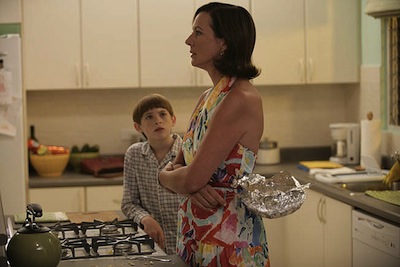
Life During Wartime is ostensibly a sequel to Solondz's breakout hit, 1998's creepoid indie darling Happiness
The new film picks up some time after 9/11, presumably during the Bush administration, though no specifics are given, only references to conflict and terrorism. Solondz's script bluntly satirizes American fearmongering and hysteria as he rejoins the story of the three sisters from Happiness. The poet Helen (Sheedy) has moved into more lucrative entertainment and moved to Los Angeles, and she is apparently dating Keanu Reeves. Trish is raising her kids on her own and is entering a new relationship with an older man (Michael Lerner), whom she finds exhilarating despite his being physically repulsive. And Joy (Shirley Henderson) has still been trying to make things work with Allen (Williams), though his bad habits have finally gotten the best of her. She has gone to Florida seeking the solace of family, though all she finds there are memories and literal ghosts (Reubens).
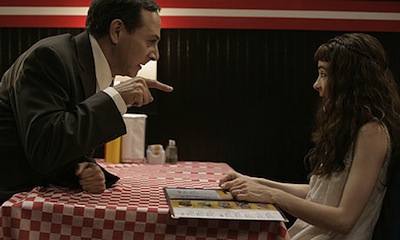
Bill's release from prison is poor timing for Trish. Though he only has contact with his eldest boy (Chris Marquette), the knowledge that he is still alive confuses Timmy right at the time when the younger child is supposed to become a man. We meet the kid as he is writing his Bar Mitzvah speech, and Life During Wartime climaxes with the celebration. In between, Solondz pokes lots of old wounds to create excuses to discuss his greater meaning--which to my eye is not so very great. I find his from-the-mouths-of-babes shock tactics to be utterly predictable and banal, and his filmmaking technique cheesy. He lights his interiors like sitcom sets, and his use of music sounds like an ironic appropriation of cues from Lifetime movies and Afternoon Specials. It's as if he wishes to mock these other things and suggest that his work is a knowing upgrade from the pabulum most of America swallows on a regular basis. The smugness is off-putting.
Others will disagree. (My good friend Christopher McQuain, for one.) I may not be the best person to weigh in on this film. I haven't liked any of Solondz's previous films, and in fact, I gave up on him completely after 2001's laughably shallow Storytelling
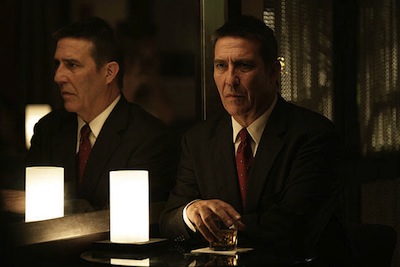
The film lost me as it wore on, however. Scenes exhibiting what seems to be genuine heart sometimes started to woo me back, but Solondz presents them with such a snide levity, he undercuts his own emotion. It's hard to tell if these are flashes of insight that the director can't sustain, or if he simply knows how to toy with his audience in such a way that he draws us in only to punish us for trusting such open displays of cliché. Though the artist would likely claim he speaks for the miscreants because he is one, I can't shake a lingering suspicion that he has contempt for both his audience and his characters, and for me, he's got to love at least one of those groups if he can't love both (forgive or forget, sir!). Effective portrayals of misanthropy require some kind of affection for the misanthrope, but it's difficult when the misanthrope is the artist himself. His films come off like the petty revenge of a kid who felt no one stuck up for him, and though Life During Wartime strikes me as being less venomous than prior efforts, it only makes me think there is worse to come, that by retreating to relive earlier successes, he is wooing back his previous admirers just to strike harder next time.
That said, if Solondz's films have been up your alley in the past, while Wartime may pale in comparison to its predecessor in terms of newness or originality, you will probably still enjoy it. Even for someone who didn't care for it like myself, Solondz has stacked the deck with a uniformly excellent cast, and they all perform to the best of their skills. Sheedy in particular takes charge of the film for her one full scene, reminding us what a loss it was for filmgoers when her career went stale.
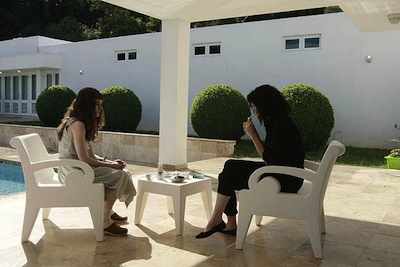
Likewise, the presentation of Life During Wartime on Blu-Ray displays the usual technical excellence we have come to expect from Criterion. The widescreen image is immaculate, with gorgeous colors and the sharpest resolution. The 5.1 audio mix also makes great use of the full surround possibilities. Supplements on the disc includes a lengthy Q&A with Solondz and making-of documentary featuring the principle cast that should appeal to fans. The Q&A in particular is put together with questions submitted through Criterion's website, and the director is very open to engaging in the discussion. While his films may often come as one-way didacticism, the supplements are anything but.
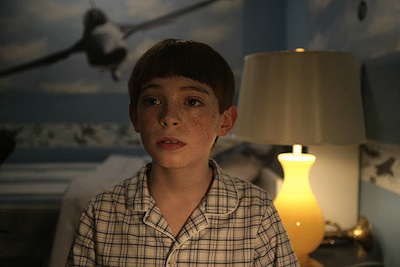
Please Note: The images used here are publicity stills, not screencaptures from the Blu-Ray.
This disc was provided by the Criterion Collection for purposes of review.

No comments:
Post a Comment